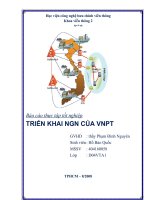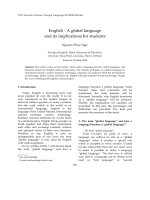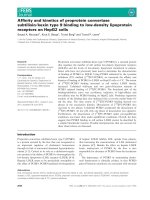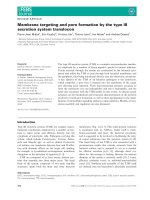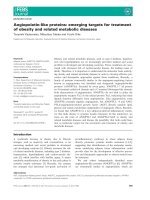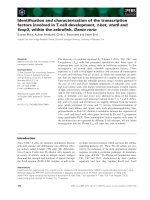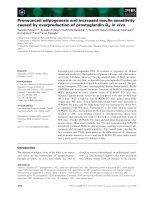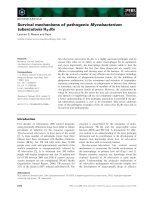Tài liệu Báo cáo " English - A global language and its implications for students " ppt
Bạn đang xem bản rút gọn của tài liệu. Xem và tải ngay bản đầy đủ của tài liệu tại đây (147.91 KB, 7 trang )
VNU Journal of Science, Foreign Languages 24 (2008) 260-266
260
English - A global language
and its implications for students
Nguyen Thuy Nga
*
Faculty of English, Hanoi University of Education,
136 Xuan Thuy Street, Cau Giay, Hanoi, Vietnam
Received 15 March 2008
Abstract. This article writes on the factors which make a language become ‘global language’ and
discusses about how English achieves that status. The impacts of Engish as a global language on
Vietnamese learners, science, business, technology, education are analysed. With the development
of technology, media, science, education etc. English will help students broaden knowledge, change
the way of thinking and brighten career prospect.
1. Introduction
*
Today, English is becoming more and
more popular all over the world. It is not
only considered as the mother tongue of
about 60 million speakers in many countries
but also used widely in the world as an
international language. English is the
language of the United Nations, international
summit meetings, science, technology,
business, tourism, medicine etc. As the mean
of communication, English brings people on
Earth together and helps them understand
each other and exchange material, cultural
and spiritual values of their own countries.
Needless to say, English is now an
indispensable part of our lives; the term
“global language” is now used for English
with wide acceptance.
In my writing, firstly, I will discuss about
the term “global language” and how a
______
* Tel.: 84-4-7565992
E-mail:
language becomes a global language. Some
theories, ideas and comments will be
mentioned; the main features will be
discussed. Secondly, why English dominates
as a “global language” will be analyzed.
Thirdly, the implications for students are
presented. In this part, the advantages and
difficulties are provided. The final part
presents the summary of the study.
2. The term “global language” and how a
language becomes a “global language”?
- The term “global language”:
From Crystal’s [1] point of view, a
language can achieve its role as a “global
language” when it reaches a special role
which is accepted in every country. Crystal
[1] also claims that there are two main ways
to make it possible to make a language
“global language”. The first way is official
way, that is, a language can be chosen to be
used as “first language” or “second
Nguyen Thuy Nga / VNU Journal of Science, Foreign Languages 24 (2008) 260-266
261
language” in a country. Therefore, the chosen
language will be used in all kinds of
communication, in academic fields as
technology, science, media and in
government. A language can also have
“official” role, “semi-official” status or stands
as foreign language. As Crystal [1] puts it “
being used only in certain domains, or taking
second place to other languages while still
performing certain official roles”. As a result, to
survive in these societies the need to master the
language is very important if not essential.
The second way to achieve the status is
by receiving education priority. Although a
language is not an “official language”, it is
taught in school as a compulsory subject for
children or even for adults who need it. Take
Russian for example, that language received
education priority not only in the countries of
former Soviet Union but also the countries
under its sponsors as Vietnam, Mongolia.
However, education privilege for a language
is not always fixed, one language can replace
the other in the process. Vietnam is a clear
illustration of the replacement process, since
Vietnam War, Russian was used as the main
language and it was taught as compulsory
subject in schools and universities. Since 90s,
English has replaced Russian as the main
language almost every where: schools,
universities, magazines, books etc.
In short, a language is called a “global
language” when it achieves the official status
and education priority in almost every
nation, as a result, that language “will
eventually come to be used by more people
than any other language” [1].
How a language becomes a ”global language”
There exit several explanations about
how a language achieves a “global status”.
Some believe that easy grammar structures,
familiarity in vocabulary, and the rich in
culture. etc. make a “global language” and
language can exit independently. However,
the said reasons above only cannot make a
language “global”, many languages are easy
to study in terms of grammar and vocabulary
but they are not “global”. Here, I agree with
Crystal in respect of his point that a language
cannot exist independently without a strong
power-base (economic, military, politic). As
he puts it “language exits only in the brains
and mouths and ears and hands and eyes of
its users. When they succeed, on the
international stage, their language succeeds.
When they fail, their language fails”.
The essential reason to make a language
“global” or “international” is the power of its
people. Crystal assumes the power here includes
the power of military, politic and economic.
Look back at the history of Greek and Latin
language which were used as international
language in Middle East and Europe, we can
find out that they became so popular not
because of their scholars or scientists but
because of their military power [1].
To achieve the “global” role, military
power is needed, however, to keep and
develop the status, political and economical
power are essential. In other words, to
maintain the status, a language needs a
strong base and force to popularize itself.
Hardly anyone wants to learn a language of
week and poor nation with no international
political status.
Needless to say, military power, political
power and economic power are the three
indispensable factors to make a language
“global” and to keep its status.
3. Why English dominates as a “global
language”?
English is used as an official or semi-
official language in over 60 countries, and has
a prominent place in a further 20. It is either
dominant or well established in all six
Nguyen Thuy Nga / VNU Journal of Science, Foreign Languages 24 (2008) 260-266
262
continents. It is the main language of books,
newspapers, airports and air-traffic control,
international business and academic
conferences, science, technology, medicine,
diplomacy, sports, international
competitions, pop music, and advertising.
Over two-thirds of the world’s scientists
write in English. Three-quarters of the
world’s mail is written in English. Of all the
information in the world’s electronic retrieval
systems, 80% is stored in English. English radio
programmes are received by over 150 million
in 120 countries. Over 50 million children study
English as an additional language at primary
level; over 80 million study it at secondary level
(these figures exclude China). In any one year,
the British Council helps a quarter of a million
foreigner students to learn English, in various
parts of the world. In the USA alone, 337,000
foreign students were registered in 1983
Crystal [1]. Cited in Pennycook [2].
“English is used as the main discourse in
fields such as science, economics, politics and
technology and this has cemented its place as
the language of global communication”.
From the information above, it is hard to
deny that English has achieved both official
status and education priority in many
countries. 400 years ago, the number of
English users was around seven million
people but the number now increases
dramatically Philipson [3]. According to
Crystal [1], in the late 1990s, around 1,2 and
1,5 billion people use English. Why English
can achieve its “global status” can be
explained in terms of its military might,
economic and politic power. British military
might in 19
th
century together with its
world’s leading industrial and trading role
and its political imperialism had “sent
English around the globe” and “a language
on which the sun never sets” [1]. Moreover,
with the development of technology, science,
media, share market, medicine… the need to
have a common language is required. The
reason why English is chosen may lie in the
fact that the internet language or business
language, airport language and also the
language behind the US dollar is English [1].
Furthermore, education systems in English
speaking countries are developed, each year
hundreds of thousands students apply for
education training there. One of the main
languages used in United Nations conferences
is English, also, the language in world summits
or conferences or seminars is English.
Culpepper (1997), cited in Russell [4] claims
that today English is used as the chief language
in every single way of life such as commerce,
diplomacy, pop music, publishing and so on.
English is not only the “international
language” in business, airport, tourism but
also the main language used in education or
academic communication as science,
medicine etc, therefore, to master English, in
a way, will affect the future of a person.
Philipson [3] also shows that as books used in
university’s programs are written in English,
in order to achieve higher education
qualifications, students must successfully
overcome the pre-requirement: English.
After all, with the power in military,
politic to achieve the “global status” and
super power in economic to maintain and
expand, English now strongly confirms its
undeniable dominance as a “global
language” in both academic communication
and every day fields.
4. The implications for students who use
English as a foreign language
In this writing, firstly, I will look back at
the languages, which once were the official
language in Vietnam. Secondly, I will discuss
the implications of English to students in
Nguyen Thuy Nga / VNU Journal of Science, Foreign Languages 24 (2008) 260-266
263
Vietnam who use English as a foreign
language. In this part, advantages and
disadvantages will be presented.
Since the early 90s, the open door policy
has brought good opportunities for
foreigners to invest into Vietnam, for tourists
to visit the country. As a result, English is not
only an interest but also a practical and a
great demand for many people. Especially in
some recent years, English has become a
compulsory subject in curriculum at many
secondary schools as well as universities in
Vietnam, and its study has been considered
as an academic pursuit. Books, magazines
and internet language are written in English.
Furthermore, most of university programs
are strongly connected to English language.
Therefore, the need to learn and master that
language is essential to students who want to
gain success in future. However, the need to
get the competence level of English is not
special if we look back at the history of
languages, which once dominated as the
official language in Vietnam. A language can
achieve the official status in one country if its
people have great influence (economic,
military, politic) on that country.
For a long time, Vietnam was under the
conquer of China, Chinese was the official
language in Vietnam, the way of thinking
and the academic style in every fields as
writing, laws, media are dominated by
Chinese way. Thinking styles, lifestyles of
Vietnamese people were nearly educated in
Chinese way. To learn a language is to access
and absorb its culture, as a result, Vietnam in
a way became a “small part” in great Chinese
family. From 1854, being one of French’s
colonies, Vietnam accepted French as official
language, writing systems, medicine, and
science. etc. changed according to French
way. However, Vietnamese ways of thinking
were deeply influenced by Confucian way,
the power of French language as well as
power of France was not strong enough to
make a dramatic change in people’s mind at
that time. After that period, Russian was once
considered as official language during
Vietnam War and several following decades.
Books, magazines, literature works,
information, science were brought in by
Russian experts. At that time (1980s) the
main business partners of Vietnam came
from Russia or countries of former Soviet
Union, as a result, students as well as adults
studied Russian because it was the only way
to access to technology and science and to
master that language was the insurance for
their future education or career. Russian was
taught in schools, universities, hardly could
we find a person who could not produce
some Russian words.
Since “doi moi” with “open door” policy,
Vietnamese people have more chances to
access to new world with various
information, books, high technology and
science (which are in English). Furthermore,
Vietnam has more chance to do business with
other countries, tourism develops, more
foreigners visit Vietnam and the language
often used is English; as a consequence, the
need to understand and use the “global
language” is essential. What’s more, with the
wide spread of internet and super power of
English speaking countries in economic,
politic (the USA, the UK, Canada…); it is
natural for English to replace Russian and
becomes official language in Vietnam.
The implications of English can be seen
clearly in every fields in Vietnam as science,
business, media, and technology, education.
These days, people use English as an
important tool to access information and to
gain knowledge for their needs. For students,
English also has important implications to
their study as well as their future career.
Nguyen Thuy Nga / VNU Journal of Science, Foreign Languages 24 (2008) 260-266
264
The first and the most significant
implication of English to students is to
broaden their knowledge. Through internet,
books, magazines, media, students have
good chance to access to various information,
lifestyles and knowledge around the world.
Today, about 80% of new and update
information can be loaded down from
internet, thus, students can throw themselves
in the world of information, analyze, use the
knowledge they acquire for their own
purposes. With that knowledge, students can
have their own, independent way to
approach then deal the issues they have.
Critical, independent and open thinking,
therefore, are built up and developed.
Thanks to their broaden knowledge, students
will then evaluate their ways of thinking and
change or develop it in a suitable and better
way. The change in students’ thinking can be
seen in their study. Students become more
open and straightforward; they can express
their opinions, make their voices heard by
showing their attitude to issues or even argue
with teacher, which would be considered
rude and illiterate according to traditional
way of thinking. Vietnamese people for a
long time follow the Confucian way of
thinking which always ask for obedience and
‘teacher- center’ of students. Students had no
chance to express their ideas, they had to use
the indirect way to talk about a matter or
issue, furthermore, what teacher said was
considered “perfectly right” and the “power
distance” was so strong in Vietnamese
culture Pham Ha [5]. For the deep influence
of Confucian, students “might be seen as
passivity, insincerity and stupidity” by
western people Ellis [6].
Therefore, when talking about the
positive change in Vietnamese students’
thinking and behavior in recent years we
can’t not mention the important role of
English in that “wind of change”.
The second and no less important
implication can be realized in students’
ambition, that is a good position in future
career. As English plays a vital role in every
field (business, tourism, politic, economic
etc.), success or failure in English may be
decisive in their future career prospect. If a
student masters or has the competence level
in English, s/he will surely have more chance
to have a better job or a chance to receive
good training in other countries or even
power over some matters than other who
does not. If a student wants to receive
scholarship or apply to school, university in
other country, besides the study grade, one of
the most important requirements is
competence level in English. Moreover,
English helps students built up their
confidence and activeness. Armed with
knowledge and the global language they can
make themselves understood almost
everywhere, students surely have confidence
to deal with the issue or people they meet
and ready to absorb new things. Surrounded
by western lifestyle, Vietnamese students
absorb the practical and active way of
dealing and approaching new things. With
English students can get more information,
knowledge in the field they are interested in.
Together with confidence, activeness, thus,
the door of new world, good job will open
wider for them.
In short, with the widely spread in
Vietnam, English has helped students
broaden knowledge, change the ways of
thinking and build up confidence and
activeness, brighten career prospect for each
student.
Although English has made positive
contributions to Vietnamese students’
Nguyen Thuy Nga / VNU Journal of Science, Foreign Languages 24 (2008) 260-266
265
learning and thinking, it also goes with
disadvantages.
English is one of the main factors, which
cause the turbulence in Vietnamese
traditional culture. As mentioned above,
Vietnamese ideology was strongly influenced
by Chinese’s philosophical traditions. The
ideas of obedience, politeness and knowledge
were built up under Confucian systems.
Students should always place themselves in a
lower position to the teacher, they should not
argue or contradict their teacher publicly [3],
[2], they should follow their teacher findings
or follow wisely the already-known “proper
moral norm” [3]. Therefore, the change in
students’ thinking today has made a terrible
shock to people, who for a long time are
Confucian’s followers, when students can
argue with teacher and fight for their
opinions. New and sometimes too direct
ways of approaching and dealing an issue of
students can cause the insulting feeling to the
“old generation”. Armed with update
knowledge, new thinking way, over-open
lifestyle, and practical mind, young people
are obsessed by an idea of destroying the old
to build the new one. Morality, family
relations, and human relations can be
ignored to fit with the lifestyle they learnt
from western films, books etc. Many young
people become more aggressive, they are too
far practical to deal things with heart, sorrow
and humanity, which was incredible in the
past. The relationship between people is no
longer in close contact as they are busy
preparing plans for their future. They ignore
the true fact that the so-call “old culture” or
‘backward’ traditions must have positive and
strong base to survive through out nearly a
thousand year. The change in young people’
thinking and behavior has led to the sad fact
that they are day by day losing their identity.
The concept of morality, traditional behavior,
culture is seriously damaged.
Besides, English also causes unfair
competitions. When English is badly in need
in Vietnam, people are not examined with
their real ability but degrees and English.
People who do not have chance to learn
English can not get the suitable job or
position while other without ability but
fluent in English get all the chances. More
and more people enroll in English class to get
the certificate in order to have promotion in
job or to keep their seats in company.
Consequently, the trend to have English
certificate becomes popular, and people seem
to care about quantity not quality. A large
number of people have degree of competence
level or advanced level; however, they can
hardly produce correct and meaningful
English sentences or utterances.
To sum up, together with advantages
English also causes unsolved problems as
tradition turbulence such as moral
degradation, wreck in human relationships
and inequality in certain form of economic
and education.
With the wide spread and its usefulness
in many fields of life, English has helped
people closer in “global village” with inter-
connected interests in business, politic,
benefit, science, technology, military… and
its role as “global language” is undeniable.
Thanks to the dominance and wide use of the
language in media, books etc, people have
more chance to get to know about other
countries, cultures, literature works etc, thus,
broaden their knowledge with the help of
common and popular language.
Furthermore, English with the development
of technology, science, media, will help
opening the door to a new, better and
dynamic world.
Nguyen Thuy Nga / VNU Journal of Science, Foreign Languages 24 (2008) 260-266
266
5. Conclusion
In this writing, I have discussed about the
term “global language” and two ways to
make a language “global”, they are official
status and education priority. I also have
given examples and cite ideas of [1]
explanation to the way a language achieve
the status. To explain how a language
becomes “global”, I follow Crystal’s
assumption about three factors that play vital
role, they are military, politic and economic
power. In this part, I have presented some
examples to make the assumption clear. To
pursue the issue why English dominates as a
“global language” I use the factors that are
proved in the first part to compare to English
role. By comparing and analyzing the role of
English, it is shown that English has met all
the requirements of “global language” with
the military, politic power to achieve the
status and economic super power to maintain
and expand it. To illustrate the roles of
English, I present the implications of English
to Vietnamese students. I have analyzed and
confirmed the advantages in terms of
knowledge, thinking way and career
prospect to student, on the other side,
disadvantages of that implication such as
tradition chaos and inequality in competition
are also looked into.
References
[1] D. Crystal, English as a global language
Cambridge, Cambridge University Press, 1997.
[2] A. Pennycook, The Cultural Politics of English as
in International Language, Longman Publishing,
New York, 1994.
[3] R. Phillipson, Linguistics imperialism, Oxford
University Press, HongKong, 1992.
[4] B. Russell, How can real intercultural
communication be achieve?, Un published
Manuscript.
[5] Pham Ha, How do Culturally situated notions
of “polite” forms influence the way Vietnamese
post graduate students write in English,
Australian Journal of Education 3 (2001) 296.
[6] G. Ellis, The Appropriateness of the
Communicative Approach in Vietnam: An
Interview Study in Intercultural Communication,
Master Thesis, Latrobe University, 1992.
Tiếng Anh - Ngôn ngữ toàn cầu
và tác động của nó với người học ở Việt Nam
Nguyễn Thúy Nga
Khoa tiếng Anh, Trường Đại học Sư phạm Hà Nội,
136 Xuân Thủy, Cầu Giấy, Hà Nội, Việt Nam
Bài viết này viết về những yếu tố giúp một ngôn ngữ có được vị trí toàn cầu và những điều
kiện để giúp cho tiếng Anh có được vị thế đó. Những tác động của ngôn ngữ toàn cầu với người
học ở Việt Nam cũng được đề cập đến trong bài viết này. Tác động của tiếng Anh vào nhiều lĩnh
vực của Việt Nam như khoa học, kinh doanh, truyền thông, công nghệ và giáo dục cũng được
xem xét và phân tích. Cùng với sự phát triển của công nghệ, truyền thông, khoa học tiếng Anh
sẽ giúp mở cánh cửa của một thế giới mới, tốt đẹp và năng động hơn đối với sinh viên.

